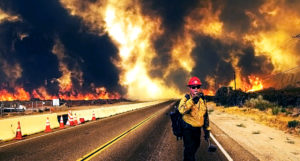In the classic John Huston film Beat the Devil, the diminutive character actor Peter Lorre delivers a concise disquisition on the nature of time: “What is time? Swiss manufacture it. French hoard it. Italians squander it. Americans say it is money. Hindus say it does not exist. Do you know what I say? I say time is a crook.” Amid this stream of clichés — time lends itself to such bromides — Lorre lands on the truth. With each passing second, we are losing it. Those who are overburdened by responsibilities — myself and yourself included — might even say that their time is being “stolen”. And it is into this ever-flowing river of lost time that writer and artist Jenny Odell, author of 2019’s How to Do Nothing: Resisting the Attention Economy, has now stepped, with the new Saving Time: Discover a Life Beyond the Clock.
This is a genre of writing that I, a historian by training and an around-the-clock worker by disposition, consume like Lay’s potato chips. I’ve waded through these swift waters accompanied by everyone from former Guardian columnist Oliver Burkeman’s 2021 Four Thousand Weeks: Time Management for Mortals, to ancient Stoic philosopher Epictetus’s Enchiridion — keenly aware that no moment of immersion is the same as any other and none of them will ever recur. The one thing that history doesn’t do, for good or ill, is repeat itself. What I have sought is something I will never have: more time. Not better nor more meaningful time, as Odell is proposing to find, but merely more, in terms of sheer quantity. Because while I don’t want to live forever, I do hope to live long enough to do everything I’ve committed to do, such as help my daughter enter adulthood and support my parents and spouse in their old age.
Odell is a writer about whose prior work, How to Do Nothing, I have decidedly mixed feelings. It starts promisingly enough: the opening line, “Nothing is harder to do than nothing”, is, as the kids say, a “banger”. But it soon becomes clear that Odell, an admittedly privileged person who has had lots of free time across various academic residencies, has nothing to offer me, a person who has been working 40 hours a week since his 16th birthday. Nothing, you see, is the easiest thing to have in your bank account, but you cannot subsist for long on a diet of zero income and birdwatching in Oakland’s Morcom Rose Garden. Odell, having been freed from being “occupied at a work-bench, or twirling a distaff”, as Thomas Jefferson would have wanted it, she is able to fill an inordinate amount of it.
Bubbling below the surface of How to Do Nothing is a sense of climate emergency, or climate apocalypticism. Odell is constantly out and about in nature, and conversant with all the worrywart liberal commentary about the heat death of the planet — which, like Jesus’s return in the Gospel of Mark, is always already imminent. This concern deeply informs Saving Time, giving it some of its urgency; it otherwise does the usual yeoman’s work of citing people such as British labour historian E.P. Thompson on the development of time and work-discipline, Frederick Winslow Taylor on industrial efficiency, and German philosopher Josef Pieper on leisure — all names you will encounter frequently if you have found the time to bathe in the waters of the time genre.
Odell, to her credit, seizes upon the opportunity to situate the climate emergency in a discussion of the ways ancient Greeks delineated time: Chronos — time as a sort of forward, linear progression — and Kairos — a “crisis” or rupture in time. We all live in linear time, yet experience reminders — floods and famines — of the perpetual crisis in which we have found ourselves. Odell, in prose that betrays the vast condescension of our present, seems to think of this as a 21st-century phenomenon.
It most certainly is not; Walter Benjamin’s oft-quoted “Theses on the Concept of History” reckons with a similar dichotomy of time: the “history of organic life on earth” as opposed to “Messianic time, [which] comprises the entire history of mankind in an enormous abridgement”. For Benjamin, the powder keg that was Germany’s war on Europe — which, as an expatriate Jew facing repatriation in 1940, drove him to suicide — was the crisis, his “one single catastrophe which keeps piling wreckage” in front of him as he is propelled into the future. Humans from the emergence of civilisation, have always perceived themselves as living on borrowed time — because, of course, we are; we have always been, as J.R.R. Tolkien put it, “mortal men doomed to die”.
It is the approach to mortality that separates Odell’s work from, say, Oliver Burkeman’s Four Thousand Weeks — a title that references the average human lifespan. Odell, an atheist, is concerned with climate damage to the entire ecosystem; Burkeman, who is at least culturally Jewish, is concerned with trying to lead a balanced, moderate life in the amount of time allotted to him. It is the latter view that has always appealed to me — the Earth might be ending, but to those of us raised with anything resembling a coherent religious worldview and now struggling to raise a family, everything is already ending. As Father John Misty sings in “Holy Shit”, “Carbon footprint, incest streams…planet cancer, sweet revenge…but what I fail to see is what that’s gotta do with you and me.”
It is interesting, yet unsurprising, to see discussions of personal mortality get so little attention in a work like Saving Time. As my father lay on his deathbed — he died in his own bed, at home — he remarked to me that he had always thought it easier to die alongside millions of others in a meteor strike or global conflict than quietly and at home as an old and feeble man. This, he admitted, was a narcissistic strain of thought he inherited from his own father, who despised the civilian life that followed his time as a Second World War submariner, because it offered no promise of a collective death that would serve as a coda to some grand heroic saga. Today, as Odell acknowledges, we are bombarded with daily alerts of one crisis or another. So it requires an act of will to remember that one’s own death is not an event so significant that it must coincide with the end of life as we know it. It will only coincide with the end of life as you know it.
It seems odd, then, that Odell cites Catholic philosopher Josef Pieper — not his description of Leisure, the Basis of Culture, but the fact that preparation for death is behind everything written therein. This is because, for the devout Pieper, as for Danish philosopher Søren Kierkegaard, life is a preparation for eternity. “As a teacher usually says to the youthful student, who is even now finding the time of schooling too long, ‘Now, just don’t you get impatient, you have a long life before you,’” Kierkegaard writes in The Gospel of Sufferings, “so eternity speaks with more reason to the sufferer: ‘Just wait, do not become impatient, there is plenty of time, there is eternity.’”
I am, per my earlier admission, a workaholic. The clocks that inaugurated the Industrial Revolution rule my every waking minute; right now, as I type this, it is 2:04am in Pittsburgh. I have a Zoom meeting at 9:30am and another at 11am. This is not a complaint; it is the life I have made for myself. I have read Pieper and Thompson and all the rest. I understand how time, per the historian Fernand Braudel, passes both slowly for the unbending structures of society and quickly for individuals like me. But most important, in a way that none of these books on time emphasises, I know I am going to die. My father and mother never ceased with these reminders, which echoed those of Epictetus: “What harm is it, when you are kissing your little child, to say: Tomorrow you will die?”
When my mother and I would read Norton Juster’s The Phantom Tollbooth — my favourite book in the early years of my homeschooling — we would linger lovingly over the passages about time. (There are many: one of the main characters is Tock, a “watchdog” with a clock embedded in his torso.) She would point out the inanity of the main character Milo’s early thoughts about wanting time to pass — “wherever he was he wished he were somewhere else, and when he got there he wondered why he’d bothered” — given that each moment we are bestowed by nature or heaven is a gift, the “present” (another cliché, of course). The great takeaway of the book, which brilliantly skewers the ways we waste time, was that we have as much time as we’re going to get: “Time is a gift, given to you, given to give you the time you need, the time you need to have the time of your life.” Or, as Kierkegaard puts it in Concluding Unscientific Postscript: “To be finished with life before life has finished with one, is precisely not to have finished the task.”
For those of us who have already watched our parents and a good many of our close relatives die — particularly for people, like me, who do not share Pieper and Kierkegaard’s belief in eternity — this is cold consolation, but consolation nevertheless: we’re given the time we need to have the time of our lives, and no more. Our lives, as the German philosopher Martin Heidegger puts it, are defined by “finitude”, even as “a world is worlding around us”. We exist in a state of “being-towards-death”: a fascinating state, if only to us personally or to our families and friends, that will endure until it doesn’t. There is no way to buy more time, to waste time, or even, in the final analysis, to save it. You get what you get.
Disclaimer
Some of the posts we share are controversial and we do not necessarily agree with them in the whole extend. Sometimes we agree with the content or part of it but we do not agree with the narration or language. Nevertheless we find them somehow interesting, valuable and/or informative or we share them, because we strongly believe in freedom of speech, free press and journalism. We strongly encourage you to have a critical approach to all the content, do your own research and analysis to build your own opinion.
We would be glad to have your feedback.
Source: UnHerd Read the original article here: https://unherd.com/



